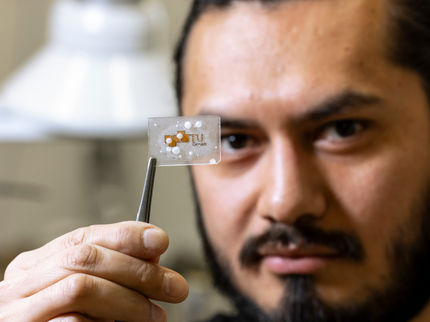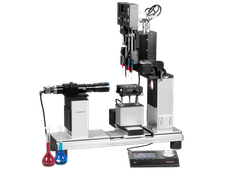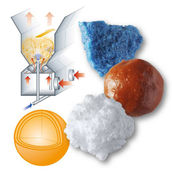Eco-Efficiency Analysis Confirms: Ionic Liquids from BASF Provide Benefits
Advertisement
The use of BASF's BasilTM process for scavenging acids in the chemical synthesis of phosphorus compounds offers significant advantages over the conventional system. This is the result of an Eco-Efficiency Analysis performed by BASF to compare various processes.
Compared to amines, which have been used traditionally in this type of reaction, the BASF process based on 1-methylimidazole is less cost-intensive and at the same time better for the environment. The new process for synthesizing phosphorus compounds, which are used as chemical building blocks to produce photoinitiators in UV-curable coatings, reliably avoids a number of problems encountered to date. Stability and product yield improve, and the process is less laborious.
The BasilTM process (the acronym stands for Biphasic Acid Scavenging Utilizing Ionic Liquids) is the first large-scale industrial process worldwide that uses ionic liquids. BASF sells these products under the trade name BasionicsTM. This process allows fast and simple removal of acids from reaction mixtures. It involves the reaction of an acid with a base that results in a liquid salt instead of solid crystals, which can cause problems in large-scale production. The use of ionic liquids means that time-consuming and expensive filtration is no longer necessary.
These liquids can be easily separated from the desired products, like oil from water, and can also be recycled. In addition, the base acts as a catalyst, thus speeding up the reaction considerably. The BasilTM developers received the "Innovation Award" of the "European Chemical News" trade journal and the BASF Innovation Award in October 2004.
Other news from the department research and development
These products might interest you
Most read news
More news from our other portals
See the theme worlds for related content
Topic world Synthesis
Chemical synthesis is at the heart of modern chemistry and enables the targeted production of molecules with specific properties. By combining starting materials in defined reaction conditions, chemists can create a wide range of compounds, from simple molecules to complex active ingredients.

Topic world Synthesis
Chemical synthesis is at the heart of modern chemistry and enables the targeted production of molecules with specific properties. By combining starting materials in defined reaction conditions, chemists can create a wide range of compounds, from simple molecules to complex active ingredients.



































































